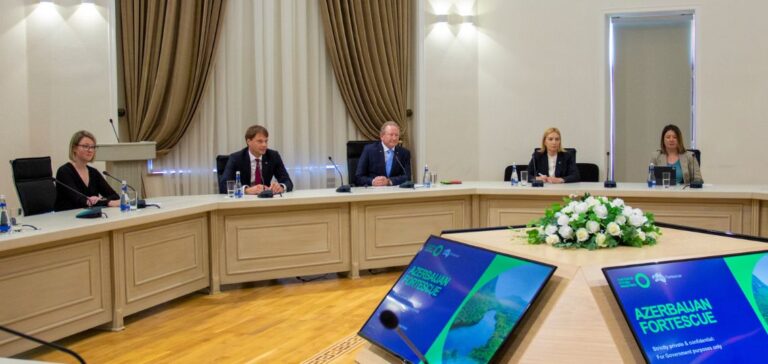Azerbaijan and Fortescue Future Industries (FFI) sign a framework agreement to develop renewable hydrogen projects.
Political support
Azerbaijan and Fortescue announce that the agreement would explore up to 12GW of potential projects. The agreement is part of the “Azerbaijan 2030: National Priorities for Socio-Economic Development” program. Energy Minister Shahbazov says:
“Of the five national priorities, the one entitled “Clean Environment and Green Growth Countries” sets concrete objectives that overlap with the agreement. Particular emphasis should be placed on the Memorandum of Understanding signed in July of this year between Mr. Ilham Aliyev, the President of Azerbaijan, and Ms. Ursula von der Leyen, the President of the European Commission, which clearly lays the groundwork for a Green Energy Corridor between Azerbaijan and the European Union.”
The Minister of Energy said that in recent years, important strategic actions were being taken with international energy companies. The objective is to create large-scale production capacities for the export of renewable energy. Thus, the Minister of Energy, Mr. Shahbazov, states:
“Azerbaijan, in addition to transforming into a green energy country, will become an important and reliable partner for the European Union, providing renewable energy and hydrogen after oil and natural gas. We believe that our cooperation with Fortescue Future Industries will contribute to the energy security and energy transition of partner countries.”
A strategic location
For Fortescue’s Executive Chairman and founder, Dr. Andrew Forrest AO, the discussions with Azebaijan are positive. Thus, according to Fortescue Future Industries, the signing of this framework agreement further demonstrates the strong potential of this partnership. Fortescue’s executive chairman and founder, Dr. Andrew Forrest AO, says:
“Around the world, we are seeing the catastrophic impacts of climate change, and we believe that renewable hydrogen is a practical and achievable solution that can help revolutionize the way we power our planet, decarbonize heavy industry and create local jobs.”
Historically, Azerbaijan is an oil and gas country. However, according to Fortescue the country is strategically located to bring green energy to European countries. In addition, Baku aims to reduce the country’s greenhouse gas emissions to 40% below 1990 levels by 2050.






















